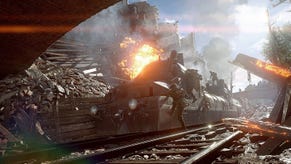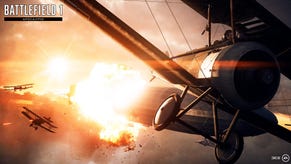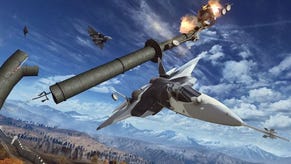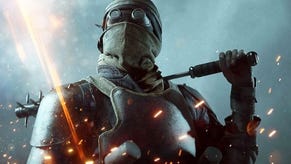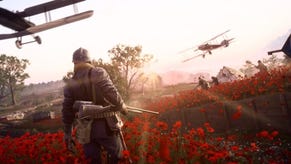Why Battlefield 1 Could Be The Best WWI Game
A historian's hopes.
One of the most difficult jobs I have as a history professor is reminding students that the First World War was a world war. I know. It seems obvious from the title. Nevertheless, here we are. The hardest students to convince of this fact are literature majors. You see, they’ve read Brittain, Graves, Hemingway, Owen, Remarque, Sassoon, and the Regeneration Trilogy. They “know” the war. Please, whatever you do, don’t try to tell them that most contemporaries viewed the war as a heroic struggle. World War One was a war about lost innocence and “lions led by donkeys.” And most of all, it was a war about the trenches of the Western Front.
I look forward to correcting student perceptions of this war, but I am also always on the lookout for anything that I can use to make that job easier: a book, a film, or a YouTube video. I never look to video games for help with this problem, but that may change with the recent announcement of Battlefield 1.
The reveal trailer for Battlefield 1 – which has now become the most liked trailer in YouTube history – was met with concern from game journalists who worried that this game will grossly distort and commercialize the hallowed history of the Great War. Yet this same trailer – filled with dubstep and hilariously explosive prop planes – left me hopeful.
Games set in the First World War are few and far between – even as we currently mark the centenary of the war. What’s more, almost all First World War games are set along the Western Front and usually include only soldiers from Western Europe. In the trailer for Battlefield 1, however, we see glimpses of settings in other areas of the world featuring a diverse collection of soldiers. As a historian, these inclusions make me incredibly excited. The First World War was truly a global war - with campaigns fought in the Africa, Asia, and the Middle East. And as the Battlefield 1 trailer implies, these campaigns often did not involve the static, trench warfare waged in France. Given these inclusions, Battlefield 1 – a profit driven, explosion-packed multiplayer shooter – has the potential to be the most historically accurate First World War game ever.
Why is it only now that we have the promise of a World War One game that actually addresses the global nature of the conflict? Cynically speaking, of course, we could note that as a multiplayer shooter Battlefield 1 needs to include other areas of fighting in order to have a diverse and lucrative collection of maps, vehicles and weapons. While I don’t discount that idea, I believe the traditional dominance of the Western Front in video games, and popular memory more generally, is the result of seeing the war through the lens of literature. As one historian put it, the First World War produced an overwhelming amount of “poignant disillusion” related to the Western Front. While this disillusion existed during the war, it did not come to dominate how we remember the conflict until the 1930s, when All Quiet on the Western Front and the war poetry of England’s Wilfred Owen and Siegfried Sassoon became the bedside reading for a world headed to yet another war.
The Second World War appeared to confirm the view of these writers that “the war to end all wars” was in fact a meaningless slaughter. This assessment of the war received greater popularity in the 1960s during the 50th anniversary of the conflict. The narrative of careless and clueless generals forcing their soldiers to early graves found an eager audience among those concerned with Vietnam, nuclear war, and tearing down old imperialist structures. It’s no coincidence that this era produced a number of famous anti-war films set in the First World War, including Paths of Glory and Oh! What A Lovely War.
While I would never question the truth of experience found in the writings of Remarque and others, it is important to contextualize their work. Though poignant, their writing represents but one of many contemporary views of the war. Most of the famous authors from this war served as junior officers, a group of men who suffered disproportionate casualties when compared with common soldiers. In Britain, for instance, only 12% of the total number of soldiers mobilized for the war died, yet of the total number of junior officers raised for the war the percentage killed was 17%. This figure led many war writers to argue that the causalities of the war represented a “lost generation,” but in fact population totals in many warring countries remained steady and quickly rebounded after the conflict, even with the postwar flu pandemic.
For most soldiers, the war represented a costly, yet momentous struggle. The established narrative of the First World War would have you believe that these soldiers were brainwashed into fighting, but this discounts their own agency. Many of them fought because they were motivated by the ideologies of the day, including monarchism and imperialism. They believed that the war had meaning and that their service was heroic. For those who worry about what veterans would think of Battlefield 1’s gung-ho portrayal of the war, consider what they would think about their struggle being mocked in black comedies like Blackadder Goes Forth or the Benny Hill-esque chase sequences in Valiant Hearts.
This war without purpose led to the end of empires in Austria-Hungary, Germany, Russia, and Turkey. It also brought about the Russian Revolution, the emergence of America as a world power, and established the basis for modern politics in the Middle East. Indeed, the current civil war in Syria as well as the Arab-Israeli conflict can be traced back to the Sykes-Picot agreement signed in 1916. Most war memorials built during the 1920s were designed to celebrate triumph rather than to solemnly linger on tragedy. Many of these memorials included captured trophies from enemy forces such as artillery pieces and helmets. Armistice Day – now referred to as Remembrance Day – was treated as a day of celebration rather than dutiful commemoration.
Similarly, a focus on the literature from the Western Front obscures the role played by the rest of the world and non-white people in the struggle. The trailer for Battlefield 1 includes nods to the war in the Middle East as well as the Harlem Hellfighters. Yet these inclusions represent the tip of the iceberg. When I lecture on the First World War, for instance, I often avoid the Western Front altogether, and talk instead about Lettow-Vorbeck and Jan Smuts in East Africa or the violent means used by the French state to impress West Africans into the Senegalese Tirailleurs. When I do discuss the Western Front, I focus on the war behind the lines, remarking on the segregation of African and Indian troops as well as the French labor camps for conscripted workers from Southeast Asia.
Of course, like many others, I too worry about how the final version of Battlefield 1 will depict the conflict. For example, as a historian of the British Empire, I am all too aware of the war’s meaning for Australia and New Zealand. But as a historian, I am also conscious of the fact that historical memory is a finite and precious object. Nothing remains in our collective memory without occasional reminders, even events as horrific as the First World War. In an ideal world, these reminders would be distributed by expert scholars presenting judicious and nuanced historical narratives. Yet writing as one of these scholars, I am only too aware of how little purchase my voice has in modern culture. Historians begging to build a memory for the First World War often cannot choose how that memory will be erected.
To give you a sense of what I mean by this, I’ll conclude with my own past failure along these lines. This time last year, I shopped around a pitch to several websites about the depiction of the First World War in video games. This article was designed to go over recent World War One games – including Sid Meier’s Ace Patrol, Valiant Hearts, and Verdun 1914-1918 – and discuss how their focus on the Western Front obscured other histories and memories of the Great War. I called this article “All Quiet on the Other Fronts.” Clever, right? Yet I couldn’t get a single website to bite, and I gave up.
I share this story not to show up editors or to encourage them to eat crow (though I know some good recipes if they’re interested) [Email me. --Ed]. Instead, I share it to emphasize the point that games like Battlefield 1, even if they include objectionable material, spark invaluable historical conversations. When I pitched my idea last year no one cared about the history of World War One. In the week after the announcement for Battlefield 1, however, we’ve been bombarded by a wave of hot takes from journalists come historians as well as intricate historical breakdowns of footage on YouTube. All of this caused by a trailer that lasts just over a minute! Imagine what will happen when the actual game comes out this fall!
I am not just happy about this development because it will make my job as a lecturer easier. I’m happy because I believe talking about the war is important. Whether you see the war as a tragedy or triumph is inconsequential when it is often a matter of remembering the war or not. If that remembrance occurs within the guise of a big budget first person shooter, then so be it.






